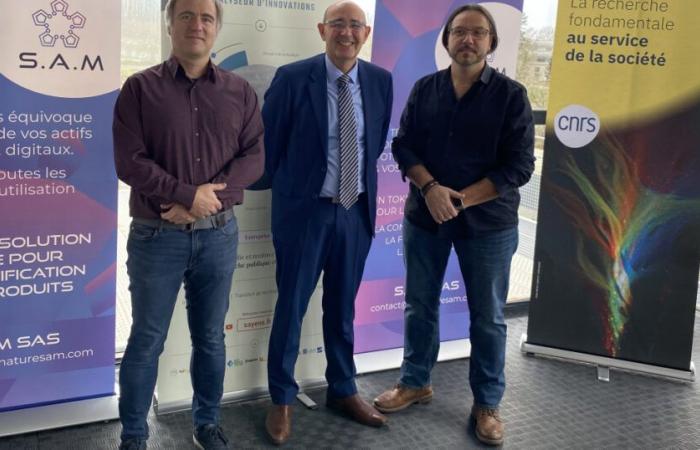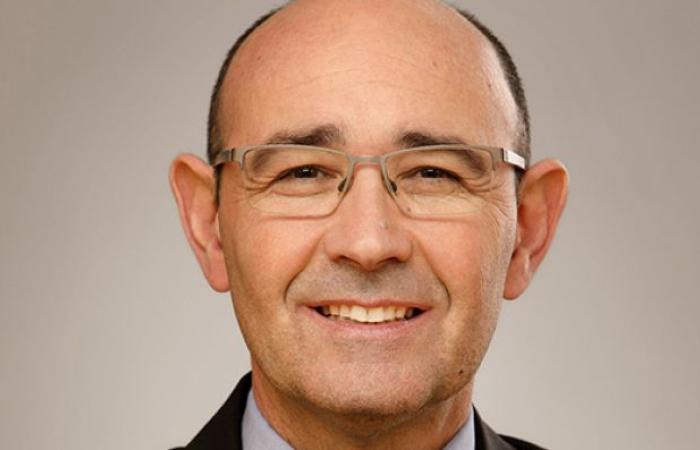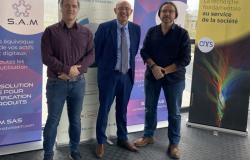In Nancy, the start-up SAM, for Signature & Authentication of Materials (5 employees), was founded in 2022, after six years of research. Labeled deeptech by Bpifrance in 2023, the company is currently launching its product authentication technology on the market, protected by around twenty patents. A launch supported by SATT Sayens (Société d’Acceleration du Transfer de Technologies), which acquired a 10% stake in SAM.
Combining materials and digital sciences
The company was born from the combined work of Samuel Kenzari, research engineer at CNRS and expert in materials sciences, and Sylvain Lefebvre, research director at INRIA, digital expert. “Our solution is a technological combination that only exists by bringing together these two expertises,” says Cédric Prins, the manager, also co-founder of the start-up.
Co-founder of SAM, Samuel Kenzari is a research engineer at CNRS and an expert in materials sciences — Photo: SAM
“We have found a way to encode data into matter,” summarizes Samuel Kenzari. From the application designed by SAM, a user can create a token (a digital file), then print it in 3D with a specific filament marketed by the start-up. Each token created can take the form desired by the client and is unique: it is impossible to replicate it, because the material is encoded directly by its physical properties. Once placed in contact with a reader-decoder to probe the material, the token is then recognized, giving rise to a first level of authentication. The reader then decodes a code or secret data.
Multiple levels of authentication
When the user scans the token with their phone and enters the code, a message is delivered, which allows access to a second level of authentication.
“This is the maximum level that we can achieve in security: there is no risk of cyberattack since the information is not entered in a database, but directly in the material,” supports Samuel Kenzari. All these steps can be carried out independently by the user, through the application, which automatically generates the token.
Many applications
“We are able to provide reliable answers to many industrial sectors facing the scourge of counterfeiting (luxury, manufacturing industry, etc.) but also to support them in dealing with the vulnerabilities of their processes and products: access control of vehicle premises, certificate of authenticity, passport systems…”, explains Cédric Prins.
Even more, the start-up wishes to use its technology to authenticate and guarantee the origin of components and products, in the defense, electronics, automobile, logistics, and even manufacturing industries. health. “We find new applications for our innovation every day,” describes Samuel Kenzari. Concretely, SAM technology would make it possible to add tokens of various shapes to products, to authenticate them.
Cédric Prins is the director of SAM — Photo: SAM
Towards rapid acceleration
Concretely, the start-up markets advice, different types of subscriptions, readers and filaments. SAM already has its first client and is in discussions with several companies in the luxury and arms sectors. “We would like to exceed one million euros in turnover quickly” anticipates Cédric Prins.

Sylvain Lefebvre is research director at INRIA and co-founder of SAM — Photo: SAM
Subsequently, the start-up could consider raising funds “of several million euros” to support its development. “We still need investments and people to deploy our technology, at the French and international level,” anticipates Cédric Prins. Among its development avenues, the start-up plans to expand to the B2C market, with the assistance of SAM licensed printers.








